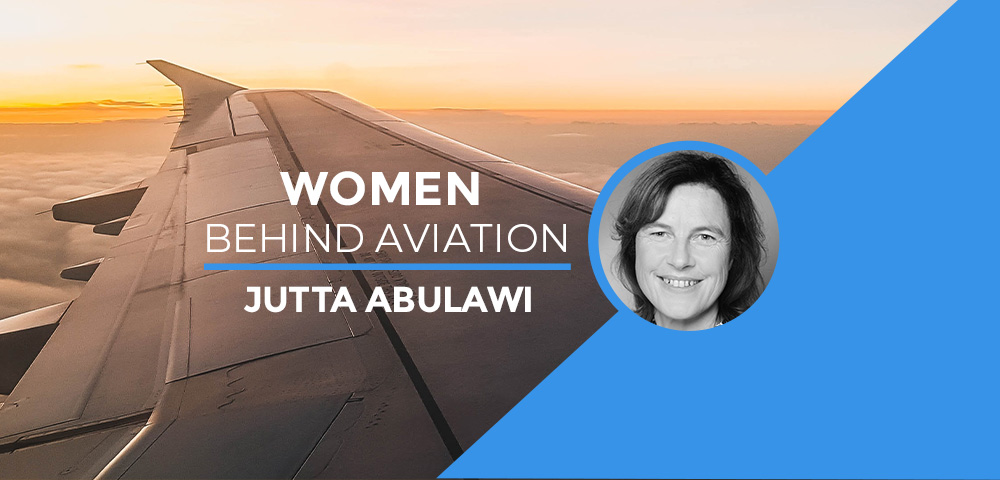The Aircraft Interiors Expo (AIX) team sat down with Jutta Abulawi, Professor for Systems Engineering and CAD at the Hamburg University of Applied Sciences, as part of our Women in the Aviation series.
This series of interviews aims to shine a spotlight on notable women in the industry and the diverse career opportunities in the sector.
For AIX’s Women in Aviation series, we sat down with Jutta Abulaw, Professor for Systems Engineering and CAD at the Hamburg University of Applied Sciences. We spoke about she has encountered and overcome prejudice throughout her career. And she says that her passion, resilience, confidence and empathy have been key to her success.
Here she tells us how she’s done it.
Jutta, How long have you worked in the aviation industry?
“My first job after graduation was in the aviation industry, back in 1988. I started my career with Airbus Operations – then still called Messerschmidt Bölkow Blohm. At that time the wide-body, commercial aircraft family A330/A340 were being developed. I was part of a small team based in Hamburg, and we prepared the documents describing the new aircraft for potential customers. I was responsible for four ATA chapters, so I had a good overview of the aircraft as a whole.
I only worked there for nine months because I soon realised that it would be more interesting to conceive and design technical solutions rather than gathering all the information from various departments and preparing documentation. At that time there were no suitable jobs available at Airbus, so I left to work as a mechatronics system designer with a small company in the special machine industry.
I was sorry to leave the aviation industry because aircraft are fascinating, complex systems with many design constraints, but I was much better paid and had a more interesting job with much more responsibility.
“Aviation has always attracted women because most jobs need brains rather than muscle.”
Jutta Abulawi
After 12 years with the machine tool company, I returned to academia in 2001 to work at the University of Applied Sciences Hamburg – in the Department of Automotive and Aeronautical Engineering. To begin with, I was more involved in projects in automotive engineering and wrote my PhD thesis in cooperation with automotive companies.
When I qualified as a junior professor, I started to teach in both automotive engineering and aeronautical engineering degree programmes. I had never given up my contacts at Airbus, so it was relatively easy for me to establish a good cooperation with the Cabin & Cargo Engineering Department at Airbus for my design classes.
Since I became a full professor in 2013, I have collaborated with Airbus and Lufthansa Technik and several engineering service providers on teaching and research projects. I enjoy these collaborations very much, particularly because they allow me to participate in interesting projects focused on solving challenges in aircraft design, manufacturing and maintenance.”
How did you get into the industry?
“I was fascinated by the complexity of large, commercial aircraft and the enormous number of people involved in their development. I was also keen to work in an international environment since I spoke English and French very well in addition to my mother tongue German.
“The civil aviation industry is working hard to close the gender gap and increase diversity.”
Jutta Abulawi
My decision to become an engineer and to work in the aviation industry was influenced by my father who himself was an electrical engineer. As he worked as a consultant for safety at work in several industries including aviation, he encouraged me to study engineering.”
What is it about working in the aviation industry that appeals to you?
“It is the precision and safety-oriented mindset of everybody involved and the excitement of the complexity of large aircraft and their life-cycle processes.”
As a woman, how do you find working in such a male-dominated industry?
“It was very hard back in the last century. Now it is still not easy, but much better. In the 1980s it was difficult for young women in engineering to find jobs with a lot of responsibility because there were still many prejudices against women in aeronautical engineering. The industry was dominated by male leaders, many of whom were very conservative and didn’t trust women to be able to master technical challenges or solve complex problems.
Fortunately, the situation has changed considerably, and most companies in the aeronautical industry are actively seeking to increase the number of women in engineering because they recognise that diversity in teams is needed to address the challenges of complex, global engineering projects.
However, the majority of engineers are still male and probably will always be. Additionally, many women have a different approach to solving engineering problems as they want to understand designs and systems before they get their hands on them or try them out.
This is often misunderstood as a kind of hesitation or reluctance, particularly when these women compete with males who are happy to take risks and prefer to learn through experience rather than analysis.
(Of course, not all male engineers are like this and there are women who are happy to try things first before analysing/understanding them.)
As children, boys tend to receive more toys which support this investigative, experimental approach to understanding technical subjects. Girls are more often encouraged to read and create beautiful paintings/sculptures, make music, get involved in roleplay or theatre, rather than building technical structures or playing with technical gadgets such as model railways, robots or remote-control cars. How children are raised is reflected in the percentages of male and female first-year students enrolling in STEM.
Programs to encourage girls to pursue a career in the aviation industry have been very successful. For instance, Girls Day, or the many initiatives taken by my university in cooperation with Airbus and Lufthansa Technik.”
Have you encountered any gender discrimination in your career?
“Oh, yes! When I tried to move from the documentation department to the engineering department at Airbus, I found that male graduates who had studied with me, but taken longer to finally graduate, were offered jobs in engineering whereas I was asked why I was not satisfied with a job in documentation which was more “suitable for a girl”.
When my children were small, some of my colleagues could not understand why I did not want to be a housewife. Fortunately, my boss and the CEO at that time had a different mindset and were happy for me to work in the design team.
Later, when I was working in academia and had started my PhD, a department head actually dared to ask me: “What the hell do you, as a woman, want to get a PhD for?” However, my university has a good culture and a policy to encourage women to seek a career in higher education and apply for faculty positions.”
As a female senior leader, why do you think it’s important for companies to address the gender gap?
“Many women have different competencies and preferences. Many of them are complementary to typical male strengths and weaknesses. The right mixture is ideal.
I think that the civil aviation industry is working hard to close the gender gap and increase diversity in teams and is definitely doing a much better job than the automotive industry.
Aviation has always attracted women because most jobs need brains rather than muscle. Even in the very early days, women became pilots and were very successful. Yet it is still rare to find women in management positions. Both Airbus and Lufthansa Technik have good programs for empowering women in leadership.
I believe that it’s important for the industry to continually attract more women to decision-making positions – particularly in commercial aviation where the passenger experience is increasingly important.
Women should be offered more hands-on experience with technical systems and manufacturing processes. Opportunities for hands-on internships are very rare, there should be more positions and women should be particularly encouraged to gain shop floor experience.”
What do you believe has been the key to your success?
“Passion, resilience, confidence and empathy.”
In your opinion, what is the biggest obstacle to women succeeding in the workplace?
“Prejudice: In my first job I was meeting with the chief designer at Airbus in Bremen to discuss the cockpit door design of the A330/A340. When I arrived at his office, he asked me if I wanted to be his secretary!
There were many situations when male bosses or colleagues would consider me unfit for certain technical tasks just because I was a woman – not because I lacked a certain qualification or experience. Fortunately, I always managed to find male supporters, who believed in my analytical and problem-solving skills, my perseverance and my solid technical knowledge.”
What would you say has been your career highlight to date?
“Being appointed full Professor of Systems Engineering in the Department of Automotive and Aeronautical Engineering at Hamburg University of Applied Sciences.”
What’s the best piece of advice you’ve ever been given?
“If you have to set priorities in life and decide between an available career path and private happiness, select the latter and then try to find new career opportunities compatible with private happiness/family life.”
“Most companies in the aeronautical industry are actively seeking to increase the number of women in engineering.”
Jutta Abulawi
What do you believe is the biggest challenge facing the aviation industry?
“Environmental issues: Media focus is prompting people to think about the carbon footprint of how they travel, how aircraft noise affects communities and the pollution caused by non-recyclable waste. I believe future generations are more likely to be sensitive to environmental issues.”
About Jutta Abulawi
Jutta Abulawi is Professor of Systems Engineering and CAD in the Department of Automotive and Aeronautical Engineering at Hamburg University of Applied Sciences (HAW Hamburg).
She holds a PhD in mechanical engineering and has worked in the aeronautical and the machine tool industry for 12 years. Jutta teaches engineering design and systems engineering at undergraduate and graduate levels in a project based approach and organizes international excursions and team projects for students.
Her research focuses on the practical application of methodical design and systems engineering approaches, including the use of parametric, reusable CAD models, software-based design assistants for additive manufacturing and systematic sketching and graphical modelling methods. In addition, she is engaged in the scholarship of teaching and learning in higher education.

